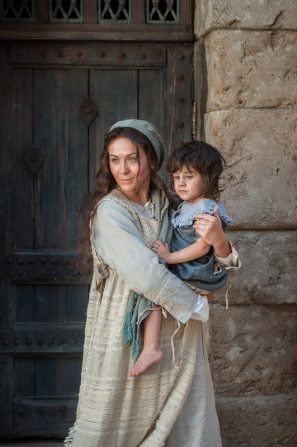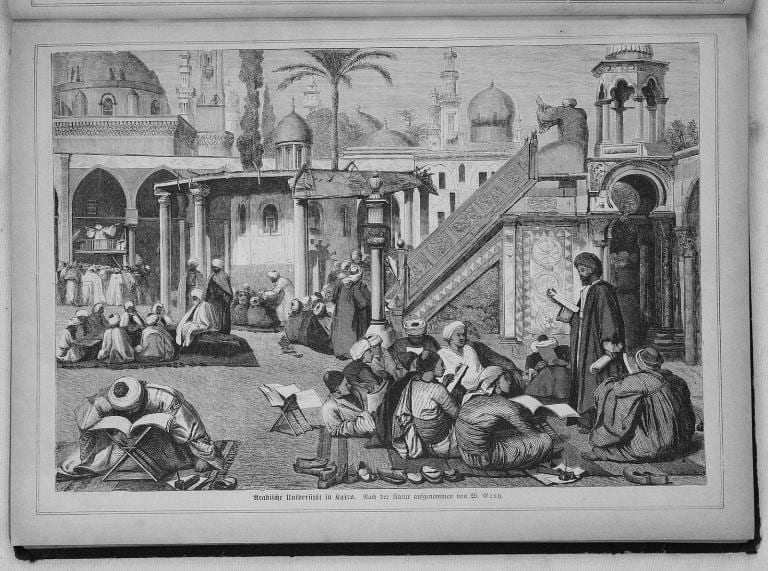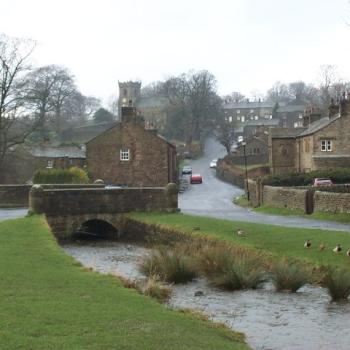
If the roads were dry and not too terribly congested with other travelers, it was probably a five-day walk from Nazareth southward to Jerusalem. And, of course, the return walk would have taken five days, as well. So, altogether, the journey down and back would have required a week and a half, on top of whatever time was actually spent in Jerusalem itself. So this was a fairly significant undertaking. Moreover, since the route — whether through the rocky hill country that forms the north-south spine of Palestine or via the Jordan River Valley — would have taken them through fairly rough and wild country (especially two thousand years ago, when the population was considerably smaller), it was safer for them to travel in a group rather than alone. That’s why it would be possible, as Luke 2:44 says, for them to suppose that Jesus was “in the company . . . among their kinsfolk and acquaintances.”

The outer court of the temple was a place where various teachers would discuss the Law with their “students,” much as still happens in some of the larger mosques of the Middle East today. Jesus himself will teach in the temple years later, during his own public ministry.
In Luke 2:48, Mary rebukes Jesus somewhat: “Son, why have you treated us so? Behold, your father and I have been looking for you anxiously.” And his reply, in Luke 2:49, is something of a gentle and implicit rebuke to her: “How is it that you sought me? Did you not know that I must be in my Father’s house?”
The contrast is obvious between her suggestion that Joseph is Jesus’ father and his statement that the God of the Temple is his Father.
Note, though, the way Luke 2:49 is rendered above, in the second edition of the Revised Standard Version: “Did you not know that I must be in my Father’s house?” This is quite different from the King James Version, which reads “Wist ye not that I must be about my Father’s business?”
The Greek is slightly ambiguous: “οὐκ ᾔδειτε ὅτι ἐν τοῖς τοῦ πατρός μου δεῖ εἶναί με;”
In his BYU New Testament Commentary volume on Luke, S. Kent Brown explains that “The expression is more abbreviated and less precise in the Greek text than it is in the King James rendition, presenting some ambiguity about the exact meaning of Jesus’ comment. Literally, we can translate it, ‘in the things of my Father,’ conveying the idea that Jesus has now engaged himself in his Father’s affairs. Another possibility is ‘in my Father’s house,’ pointing to where he has been spending the last three days.” (166)
Hence, Professor Brown’s own rendition has “Did you not know that I must be in the things of my Father?”
The 1545 Luther Bible also reflects the vagueness of the Greek rather well: “Wisset ihr nicht, daß ich sein muß in dem, das meines Vaters ist?” (Roughly, “Do ye not know that I must be in that which is my Father’s?”)
But it seems to me that a consensus is building about Luke 2:49 that tends to agree with the Revised Standard Version rather than the King James Version. Here are some alternative modern translations:
“Didn’t you know I had to be in my Father’s house?” (New International Version)
“Didn’t you know that it was necessary for me to be in my Father’s house?” (Common English Bible)
“Did you not know that I must be in my Father’s house?” (J.B. Phillips)
“Did you not know that I must be in my Father’s house?” (Thomas Wayment, of BYU)
Finally, the comment in Luke 2:51 that “his mother kept all these things in her heart” again reveals Luke’s interest in Mary’s point of view and suggests that, whether via an interview with her or with somebody who had known her, he had gained special access to it.












